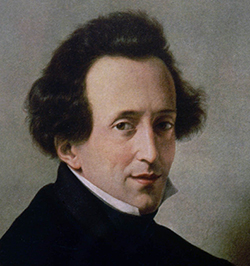
Ian Munro: Songs Without Words
Ahead of his Great Performers debut on Wednesday 16 June, Australian pianist Ian Munro takes us behind his concert program.
For many composers, storytelling is deeply embedded in almost every work they write. For some, the tale remains secret, personal and enigmatic – Chopin's ballades have had listeners guessing for almost two hundred years. Liszt, on the other hand, explicitly described narratives in detail, and one can follow the awful progress of Faust's and Mephistopheles’s every step as they pursue their amoral intentions in the first Mephisto Waltz.
It was another of those miraculous four – the great composers who were born within two years and a couple of hundred kilometres of each other (Chopin and Schumann in 1810, Mendelssohn in 1809 and Liszt in 1811) – who developed the idea of the ‘wordless song’ for piano. Felix Mendelssohn-Bartholdy began his series of piano vignettes at the age of 20 and continued with them throughout his life. The last of the piano ‘songs’ was written two years before his early death in 1847, with almost 60 examples in all, including the beautiful final one in D major for cello and piano. Mendelssohn, with his easy, winning personality and natural melodic gift, tended to treat the piano as a singing instrument, as did Chopin, although Chopin’s journey took him deep into psychological territory, whereas Mendelssohn’s musical narratives are classically contained, internally balanced, with a tendency towards comfort and urbanity.

Russian music famously took a remarkably original turn after Glinka and Dargomyshky tapped the genius of Slavic folk art, and an explosion of Russian music featuring powerful emotions and colours followed in their wake. Never was the inheritance of Western Europe forgotten; however, and surprising connections may be found between the music of Chopin and Mussorgsky; Mendelssohn and Rachmaninoff; Liszt, Chopin and Scriabin; Schumann and Tchaikowsky. Russians, like Germans, have descended with a wealth of folk culture, revelling in dark storytelling, mythical folk-heroes and devilry. Rachmaninoff, once described by Stravinsky as ‘six foot two of Russian gloom’, modelled his Preludes on Mendelssohn's Songs without Words and his Etudes-tableaux on Chopin's Etudes.
His Six Moments Musicaux of 1896, written when he was 23, gloriously follow the six-piece format of Mendelssohn, paying homage to the eponymous works by Schubert but deploying the virtuoso techniques discovered by Liszt and Chopin, with added Russian power and grandeur. They are, quite simply, a grand statement of the young Russian genius, an exhibition of all he knew and could do up to that point. Heartfelt and dramatic, they are at their core soulful songs, marking the last utterance of a young man who was, only months later, to suffer a complete nervous breakdown due to the disaster that was the premiere of his First Symphony at the hands of the probably drunken Glazunov.
My second Piano Sonata deliberately follows in the footsteps of Prokofiev and Shostakovich, as an homage to them and to the Russian musical tradition that has so shaped my own musical development. Both were pianist-composers of great pianistic ability; both began their piano sonata series with one-movement works (as did I), but, whereas Prokofiev went on to write the most distinguished and captivating series of sonatas of the Twentieth Century, Shostakovich wrote only one more, the unduly criticised Op.61. It is our — pianists' — tremendous loss that he went no further.
In 1986, in the not-yet-dying days of the Cold War, I boarded a plane to Moscow on my 23rd birthday in order to compete in the International Tchaikovsky Competition. Less than two months after the Chernobyl disaster, the comrades of Moscow were still unaware of the true extent of the accident, and tensions were high. Amidst the political uncertainty of those days, music was appreciated in Russia in a way that was striking to witness. It was clear that ordinary people had a respect and love for music that ran deeper there than in places I had lived, and that the sort of 'crucial' quality inherent in the symphonies and quartets of Shostakovich was reflected in everyday Russian music-lovers' behaviour.
My experience in Moscow in 1986 has stayed with me ever since. The story of my first round appearance, which brought me onto the front page of Soviet national newspapers, I have told elsewhere. My new Piano Sonata, which I have subtitled 'Moscow 1986' is an homage to the spirit of Russian music, telling the story of my experience and growing admiration for it, to say nothing of the great debt all pianists owe to the Russian genius for piano-playing itself, which has bequeathed us so much knowledge and inspiration.
Join Ian Munro as he explores inspired repertoire from Romantic masters Mendelssohn and Rachmaninoff, plus a new work of his own, on Wednesday 16 June at Melbourne Recital Centre. Click here to book now.
You might also be interested in
-
-
-
Explore the program notes in advance

